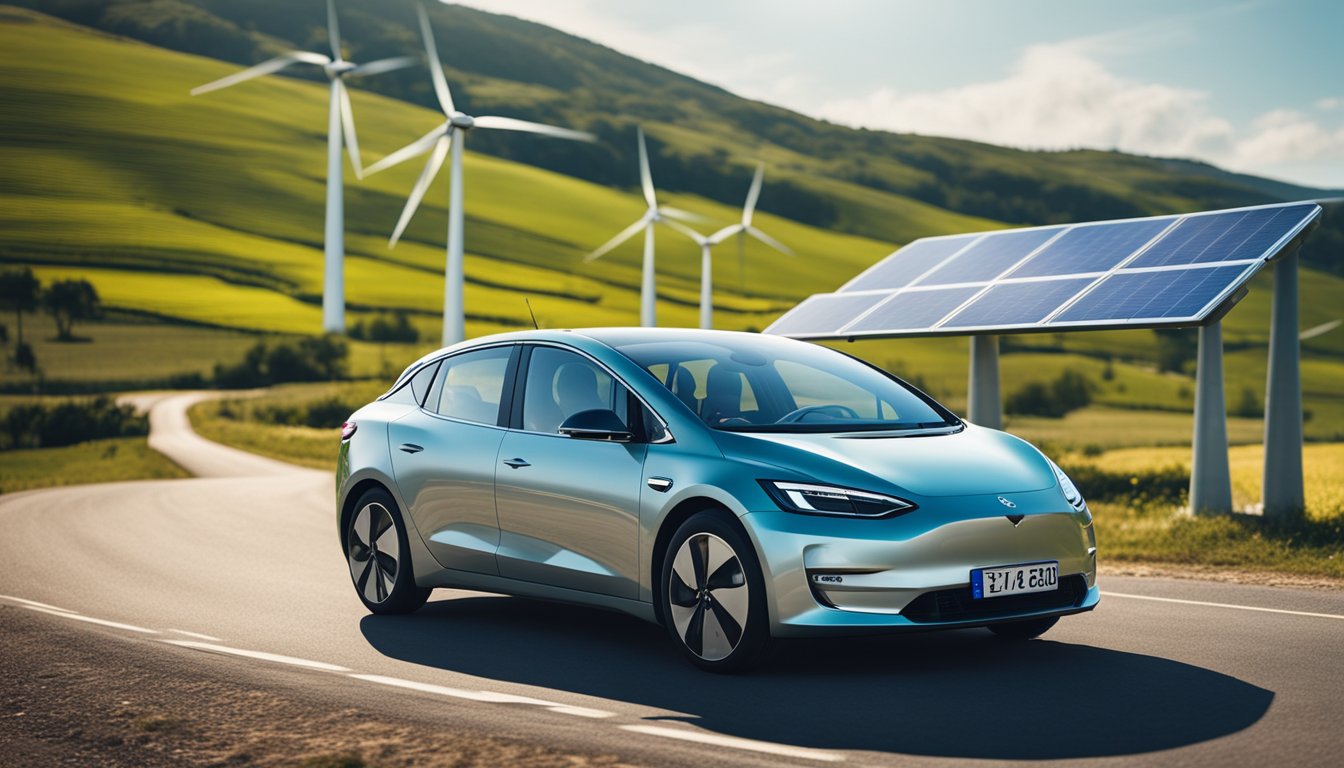Late updated: 23 Apr 2025 11:04
Written by: Sarah Hollister
Eco-Friendly Tips For Greener Road Travel: Simple Practices for Sustainable Journeys
As we embark on a journey towards reducing our carbon footprints, the significance of eco-friendly travel becomes more apparent than ever. Road trips are a cherished way to explore the world at our own pace, but they can also impact the environment if not approached conscientiously. To travel greener, consider choosing an eco-friendly vehicle, optimising packing to reduce weight, and planning efficient routes. These choices ensure that our adventures are not only enjoyable but also sustainable.

Our understanding of sustainable travel extends beyond just vehicle choice. Embracing eco-friendly practices during our journeys means paying attention to lodging options that prioritise sustainability, and opting for transportation alternatives such as biking or public transit when feasible. These small shifts in how we conduct our travel lead to meaningful reductions in our personal environmental impact.
A greener travel experience is accessible to all who wish to make a difference. By adopting shared travel solutions, like carpooling, and remaining conscious of the ecological implications of our actions, we contribute to a more sustainable planet. The journey is about making informed choices that align with our intentions to protect the environment, one road trip at a time.
Key Takeaways
- Choose eco-friendly vehicles and plan efficient routes.
- Consider sustainable lodging and transport alternatives.
- Adopt shared travel solutions to lessen environmental impact.
Essential Eco-Friendly Road Travel Practices
Efficient driving and vehicle maintenance can drastically reduce our carbon footprint while travelling. By adapting driving habits and prioritising fuel efficiency, we can minimise greenhouse gas emissions and promote sustainability.
Optimising Driving Habits
A few adjustments to our driving habits can lead to significant environmental benefits. Maintaining a steady speed whenever possible is crucial, as rapid acceleration and frequent braking increase fuel consumption and emissions. Anticipating traffic flow and applying gentle acceleration can enhance efficiency and sustainability.
Equally important is reducing speed to the posted limits. Driving at reduced speeds not only conserves fuel but also decreases emissions. Using cruise control on motorways helps maintain a consistent speed, further optimising fuel use.
Regularly checking tyre pressure also plays a role. Under-inflated tyres increase rolling resistance and fuel usage. By ensuring tyres are properly inflated, we can improve fuel efficiency and extend tyre lifespan, translating to fewer replacements and reduced environmental impact.
Prioritising Fuel Efficiency
Fuel efficiency is at the core of eco-friendly road travel. Selecting a vehicle with high fuel efficiency ratings significantly reduces fuel consumption and carbon emissions. Hybrid or electric vehicles, which often have superior efficiency, are excellent options for cutting down on emissions.
For those using conventional vehicles, regular maintenance is key. Routine engine checks and timely service appointments ensure the engine runs efficiently. Additionally, using high-quality motor oil can improve performance and efficiency.
We should also consider the load we carry. Packing light and removing unnecessary items can decrease the weight of the vehicle, thus enhancing fuel efficiency. Every extra kilogram requires more fuel, and streamlining what we bring can make a measurable difference.
Reducing Idling and Fuel Consumption
Idling wastes fuel and contributes to unnecessary emissions. Turning off the engine during extended stops is a simple yet effective way to save fuel. Modern vehicles do not require long warm-ups, so it's best to begin driving shortly after starting the engine, especially in milder weather conditions.
Traffic conditions can also be managed to some extent. Using navigation apps that provide real-time traffic updates allows us to avoid congested areas and reduce time spent idling. Opting for routes that are more eco-friendly can further limit fuel consumption.
Finally, embracing carpooling or ride-sharing whenever possible cuts down on the number of vehicles on the road, spreading the carbon footprint across multiple travellers. This practice not only reduces idling but also lessens overall fuel consumption.
Adopting Sustainable and Shared Travel Solutions

To embrace eco-friendly road travel solutions, we need to focus on increasing our reliance on electric vehicles and optimising shared travel options. In doing so, we can actively support local economies while preserving cultural heritage.
Embracing Electric Vehicles
Electric vehicles (EVs) are at the forefront of sustainable transportation. Replacing traditional petrol or diesel cars with EVs helps reduce carbon emissions significantly. Many EVs operate using renewable energy, which further minimises our environmental impact. As more charging infrastructure becomes available, long road trips in electric cars are becoming more feasible and convenient.
Maintenance of electric vehicles is generally straightforward. EVs have fewer moving parts, leading to reduced servicing costs and increased reliability. We should consider incentives offered by governments, such as tax breaks or subsidies, when purchasing an EV. These incentives make it easier to transition to more sustainable practices. Ultimately, embracing electric cars allows us to travel while safeguarding our environment.
Maximising Carpool and Shared Mobility
Carpooling is an excellent way to reduce our carbon footprint while travelling. By sharing rides, we can significantly decrease the number of vehicles on the road, leading to less traffic congestion and lower emissions. Many platforms today support ride-sharing options, making it easier to find and coordinate travel with others.
Shared mobility, including options like ride-hailing or bike-sharing services, further contributes to sustainability by reducing individual car trips. These solutions encourage the use of public modes of transport where available, thereby lessening the environmental impact of each journey. By adopting these shared travel methods, we not only cut down on costs but also promote more efficient and sustainable travel habits.
Supporting Local Communities and Cultural Heritage
When we travel, supporting local communities is paramount. This involves choosing accommodations, tours, and eateries that are committed to sustainable practices. When we support such businesses, we contribute directly to local economies and help preserve cultural heritage. It's crucial to respect local customs and participate in community-based activities.
Engaging in these practices fosters a deeper connection and understanding of the places we visit. By prioritising recycling and waste management, we can contribute to cleaner, more sustainable travel environments. These efforts ensure that our travels have a positive impact on both the planet and the communities we engage with.
Frequently Asked Questions

In road travel, adopting eco-friendly practices extends well beyond choosing fuel-efficient cars. It involves staying in environmentally conscious accommodations, using sustainable products, and supporting local communities.
What are the best practices for reducing carbon footprint while travelling by car?
It's crucial to maintain our vehicles to ensure they operate efficiently. This includes regular servicing, maintaining proper tyre pressure, and planning routes that minimise idling and congestion. Additionally, carpooling or opting for hybrid or electric vehicles can significantly cut emissions, contributing to a greener journey.
How can one identify and choose eco-friendly accommodation when travelling?
When looking for accommodation, we should seek out hotels or lodgings with certification from recognised environmental programmes. Staying at places that use renewable energy, offer recycling facilities, and promote water and energy conservation will help us minimise our environmental impact.
What are some effective eco-friendly travel products to use during road trips?
Using reusable water bottles, eco-friendly toiletries, and sustainable bags can significantly reduce waste. We should consider solar chargers for gadgets and bamboo-based travel utensils to cut down on single-use plastics during our trips.
In what ways can travellers support local communities and sustainability during road journeys?
Engaging with and supporting local businesses by dining at independent restaurants and purchasing indigenous products can promote community welfare. Participating in local eco-tourism activities allows us to directly contribute to preserving the natural environment and cultural heritage.
What should be considered when planning an eco-friendly itinerary for land-based travel?
We should prioritise visiting destinations that promote sustainable tourism practices. It's beneficial to plan trips during off-peak times to lessen our impact. Incorporating public transport and walking or cycling where possible not only reduces emissions but also allows us to experience destinations more intimately.
Could you suggest some strategies for offsetting the environmental impact of long-distance road travel?
Offsetting travel carbon emissions through certified carbon offset programmes is one viable method. Supporting reforestation initiatives or renewable energy projects can counterbalance our carbon footprint, ensuring that our travel has a net positive environmental impact.
